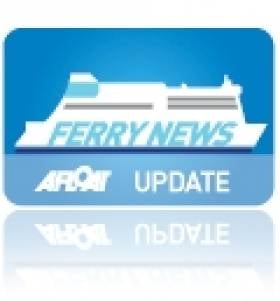Displaying items by tag: Stena Scotia
Stena Send in ‘Freight-Only’ Ferry to Replace Damaged Chartered Ferry
#FerryBackUp – Freight ferry Stena Scotia (1996/13,017grt) docked in Dublin Port yesterday for 'berthing trials' and is to provide extra capacity for freight customers next week, writes Jehan Ashmore.
She is a replacement to the damaged chartered ferry Finnarrow, which as previously reported has since reached Scotland, with a tug berthing in Greenock.
The Dutch flagged Stena Scotia (capacity: 114 trailer units) will start freight-sailings next Monday (25 February) to Holyhead, where the 12-driver-accompanied vessel had called en-route yesterday also for berthing trials, having made an overnight passage from Belfast.
It was at the Anglesey port last weekend, where an incident involved the Finnarrow's stabilisers that led to cancelled sailings.
Stena Scotia will run in tandem with ro-pax Stena Adventurer (which takes passengers) on the Dublin route. There will also be additional passenger back-up with fastcraft HSS Stena Explorer sailings on the Dun Laoghaire-Holyhead route.
All passengers are advised to call Stena Line ferrycheck number 08705 755 755, for the most up-to-date information on sailings for 'foot' and those that are 'vehicle-only' by clicking this LINK.
The other regular Dublin route serving ro-pax Stena Nordica is as previously reported on refit cover on the North Channel and is expected to return to service on 19 March.
Stena Scotia (and sister 'Hibernia') had been lying idle in Belfast since September, having been replaced by larger chartered tonnage in the form of newbuild sisters, Stena Performance and Stena Precision.
The pair (from a quartet of newbuilds built last year) operate Stena's Belfast-Heysham freight service, following a short career starting off on the Irish Sea for operators Seatruck.
She has seen a succession of name changes in recent years, as Scotia Seaways under the navy blue colours of DFDS Seaways during a brief entry into the Irish Sea market in 2010.
Before that, she sported the pale blue livery scheme under Maersk / Norfolkline North Sea service as the Maersk Exporter completed in 1996.
























































